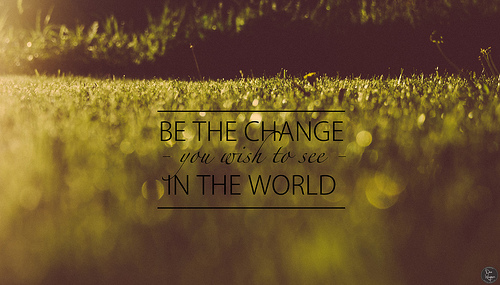We run our website the way we wished the whole internet worked: we provide high quality original content with no ads. We are funded solely by your direct support. Please consider supporting this project.
Be the Change Now
Ghandi once said, “Be the change you want to see in the world.” It’s a profoundly Kingdom teaching.
It seems to me, however, that few people adopt Ghandi’s philosophy. It’s far easier to focus our attention on how others should change. It’s far easier to spend our energy assigning blame for the problems of society on others. It’s far easier to try to control the behavior of others by gaining political power over them. This approach keeps the focus off ourselves and helps us feel righteous and wise. If you think about it, all political conflict is premised on the assumption that we who espouse a particular ideal are more moral and/or wiser than those who disagree with us.
“Everybody wants to rule the world,” as the band Tears for Fears sang. Everybody is sure the world would be a better place if only their superior morality and wisdom was the rule of the day. The funny thing is, this is precisely the mindset that keeps the world broken.
While everyone is free to assess social problems and work toward political solutions as they see fit, this is not Jesus’ way of transforming the world. He never so much as commented on the hot political issues of his day. The Jesus way of transforming the world is not by assuming a position of moral or intellectual superiority as we assign blame for society’s woes on others. Rather, it’s by assuming a position of humility and focusing our energy on the log in our own eye rather than the dust particle we think we see in a neighbors eye (Mt. 7:1-3).
From a New Testament perspective, the primary job of Kingdom people is to simply be the change we want to see in the world. More specifically, we’re to simply be the Kingdom we know is coming. We’re to manifest the future in the present; the Kingdom of God in the midst of the kingdom of the world; God’s will “on earth as it is in heaven.” We are to humbly be the first fruits of the coming harvest (I Cor. 15:20). The “first fruit” in ancient Israel referred to fruit that was picked before the rest of the crop. These early pickings were, among other things, considered the guarantee that God would be faithful in bringing forth the rest of the crop.
Whatever will be in heaven, we are to manifest now. Whatever will not be in heaven, we are to rid ourselves of now.
When the Kingdom is fully established in the future, every knee will bow and every tongue will confess that Jesus Christ is Lord (Phi. 2). So, in the power of the Spirit and the love of Jesus Christ, we who are first fruits picked ahead of time are to passionately bow our knee and confess Christ’s Lordship now.
When God’s reign is fully manifested in the future, everyone will get their life, worth, significance and security from God alone and will reflect this fullness of life to one another rather than trying to get it from one another. All idolatry will be abolished. The job of first fruits is to manifest what this looks like now. We are to display the beauty of a life that gets worth, significance and security from God alone and that is thus free from the ugliness of idolatry.
When the Kingdom of God is fully established, all that is inconsistent with the radiantly beautiful character of God will be done away with. So, empowered by the Spirit and the grace of God, we who are the sign of the coming Kingdom are called to seek to eradicate everything inconsistent with God’s character from our life and our world now.
When God’s will is fully established on earth as it is in heaven, there will be no more power structures privileging some people over others: men over women, rich over poor, intelligent over the intellectually challenged, talented over the untalented, whites over blacks, or anything of the sort. So, we who are the first fruits of the coming Kingdom are to manifest the beauty of an equalized humanity now. We are to individually and collectively manifest what it looks like for humans to be completely free from all of the artificial ranking scales fallen humans impose on one another.
When the whole of reality becomes the domain of God’s reign, as it was always intended to be, there will be no more violence, either among humans or among animals. The creation on every level will be restored to the peaceable Kingdom it was always intended to be. We who are called to manifest the future in the present must commit to eradicating all violence from our lives, and from our world, now.
When the beautiful Kingdom is fully established, the defeat of the ugly Powers will be fully manifested. We who are the first fruits of this coming beautiful kingdom are not to simply wait for this final victory: we are, as much as possible, to display now what it looks like for humans to live free from the oppression of the powers. We are to be a people who intentionally swim upstream against any aspect of our society and culture that is not consistent with the will of God as revealed in Jesus Christ.
Category: General
Tags: Justice, Kingdom Living, Non-Violence, Racial Reconciliation
Topics: Following Jesus
Related Reading

A Kingdom Not of This World
Bruxy Cavey spoke at Woodland Hills Church back in May as a part of the Tapestry series, and this is a little snippet of his sermon. It’s a wonderful description of the Anabaptist approach to politics. Take a look!

Capitalism and Greed
It’s hard to deny that capitalism is the best economic system around. It creates wealth far better than feudalism, communism, socialism or any other system one could name. But for all its advantages, capitalism has one major drawback that Kingdom people need to be concerned about: it needs people to stay perpetually hungry for more.…

Vacationing in a War Zone
Suppose a family decided to go on vacation to a nice cabin on a beautiful shore in a distant country. This vacationing family naturally wanted to tune out the problems of the world, indulge themselves, relax and enjoy life and each other as much as possible. This is simply what families do on vacation. Now…

If We’re Made For Warfare, Why Non-Violence? And What Will We Fight in Heaven?
In this episode Greg talks about our warrior nature and discusses some interesting implications of that on our understanding of heaven. Links: Website: ReKnew.org http://traffic.libsyn.com/askgregboyd/Episode_0006.mp3

Washing Osama’s Feet – blog post 8/28/07
(This post was written by Greg on Sunday, October 28, 2007. It was such a controversial entry that he had to write a follow-up post which you can read here) Brad Cole is a friend of mine who runs a ministry called Heavenly Sanctuary. This ministry puts on Conferences around the country on the Character…

On Driving and Unsurpassable Worth
Our friends the Livesay’s live and work in Haiti, and their blog is amazing. They posted a reflection today entitled On Driving and Unsurpassable Worth. It’s so worth reading. From the article: Annoyed with someone? Repeat after me: Unsurpassable worth, unsurpassable worth… Unsurpassable worth. Fine, be annoyed … but if keeping the annoyance from turning to rage…

